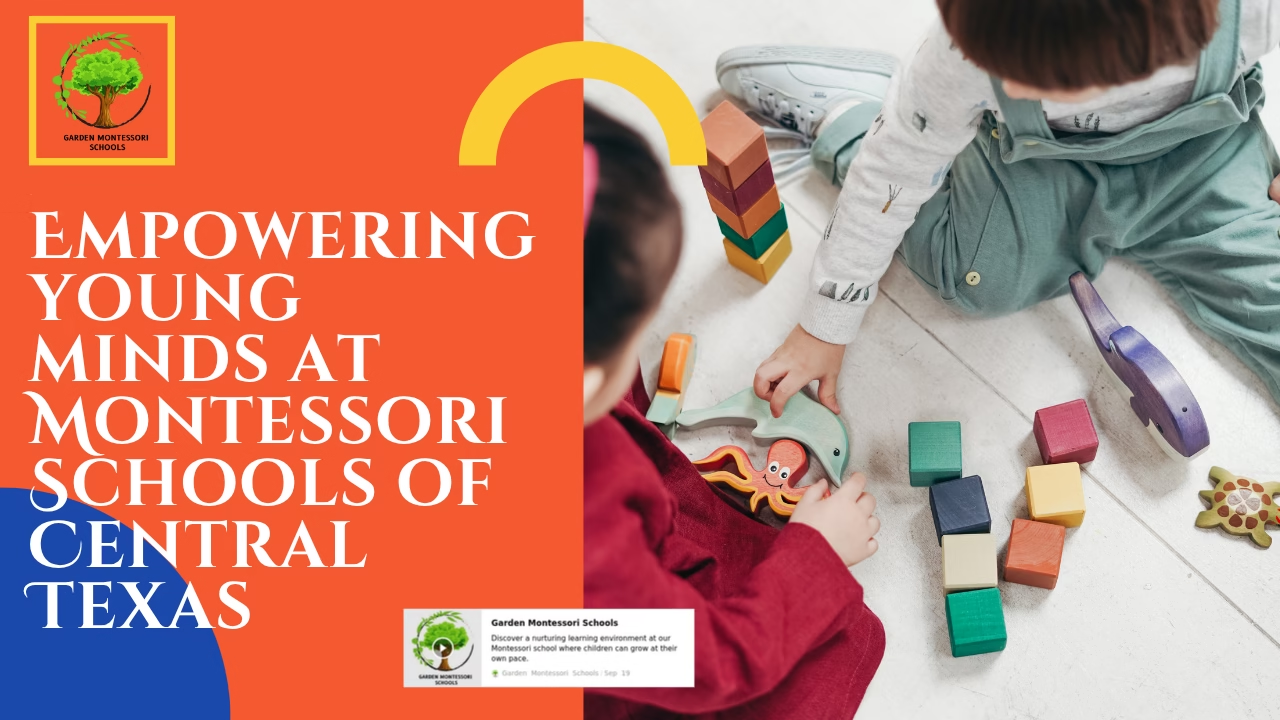It’s possible that one of the distinguishing characteristics of the Montessori setting is the prominence of the outdoor and natural environment in the process of learning. At Garden Montessori Schools we advocate for offering children a stimulating environment that allows them to play, learn and acquire practical life skills.
The architecture at our Learning Garden Montessori School combines both natural outdoor and indoor learning environments which enhances the urge to think rationally and creatively.
In this post I will lay out the advantages as well as the best aspects of our Learning Garden Montessori School and how those encourage children to learn and grow.
Why Is a Learning Garden Vital in the Montessori Curriculum?
In the construction of the Montessori school, the children’s learning garden is not merely a space outside where kids can go, but rather a resource in Learning.
The aim of Montessori pedagogy is to give the child the opportunity to experience and learn hence a garden is one such place where children are learning.
By planting, watching over and taking care of plants, children acquire knowledge about ecosystems, life cycles and to some degree, social responsibility.
The garden instills in children the understanding that learning is not confined within the four walls of a classroom and paves way for them to discover the universe.
At Garden Montessori Schools, we weave the learning garden through the children’s program as well so that the students learn while awakening their senses to nature.
They learn it in the best way possible and deepens their understanding which leads them to have an inquisitive nature and eventually start thinking scientifically, while at the same time building stronger ties with the ecosystem.
How Does the Garden Benefit the Child’s Brain Development?
The garden is one of the important implements for enhancement of mental abilities often referred to as intelligence or more correctly the IQ when employing the Montessori method.
As children do plant the seeds, the plants grow and children tend to them, they are already learning principles of measurement, observation, and cause and effect relationships.
Due to the physical nature of gardening, more conceptual topics are easily grasped because children are able to see the results of their labor instantly.
The Learning Garden Montessori School promotes nurturing through interaction with plants and animals as this enables children to be decision makers and problem solvers.
These experiences provide a strong basis for critical thinking and fosters intellectual growth as is the tried philosophy within Montessori settings which focuses on children learning at their own pace.
Why Is It That Nature Enhances Such Emotional and Social Development?
Being in contact with nature is indeed a huge boost for emotional health. The Learning Garden space is ideal since it provides a supportive atmosphere where children are able to think, calm their bodies, and merge with their emotions.
Also, social skills such as working together, communication, and understanding are developed through working in the garden.
In the Garden Montessori Schools, children appreciate the importance of team work whether it is watering plants, or doing the harvesting. Such an atmosphere nourishes a sense of belonging, a feeling of duty, and respect amongst one another.
Through common work in the garden, children learn to be tolerant and considerate, which is important for their emotional and social growth.
What are the Physical Growth Benefits in the Garden?
Gardening is a perfect task to foster both the fine and gross motor movements in children. When children scoop, soil, seed, water plants or even carry the tools, they are able to engage in movements that in turn help them gain stamina and coordination as well as dexterity.
These activities are also beneficial because they are certainly helpful in developing control of muscles, balance and coordination especially of the eyes and hands.
At Garden Montessori Schools, we issue children tasks that require them to move around in the garden in an attempt to ensure that the children are given activities that involve movement so as to ensure their physical development is well catered for.
These activities also aim at promoting child health because they are required to go outside and be active which is an important aspect for fitness.
In terms of What Makes the Learning Garden Montessori Method to Be Viable?
These are key elements at Garden Montessori Schools to our Sustainability ethos. It integrates culture and practice through learning – children understand their responsibilities for the environment because they practice organic gardening, compost, and conserve water in our Learning Garden.
Children understand the importance of protecting the earth as well as grasping ecological processes.
By actively participating in eco-friendly activities, children gain a sense of responsibility towards nature. Their understanding of what it takes to conserve natural resources deepens, encouraging them to make green choices in their day to day lives.
The garden is an effective tool for providing hands-on instruction on sustainability which is critical for the young ones of tomorrow.
How Do Learning Landscapes Encourage Self-sufficiency?
Self-sufficiency is one of the important tenets of Montessori philosophy and the Learning Garden is the ideal environment for getting children actively engaged in their self-directed work.
The children bear the burden of their plants by watering them and keeping the area neat and clean. Such liberty develops a sense of satisfaction and achievement in the children as they work and witness the result of their activity.
At Garden Montessori Schools, decisions about how to take care of the garden are left to children, hence promoting use of initiative in the children.
Such independence enhances the self esteem of children and enables them to take initiative in every aspect of their education.
How Does the Learning Garden Boost Sensory Development?
The Learning Garden allows for sensory development in children as they breathe in the aroma of blooming flowers, feel the texture of soil and leaves among other things.
All five senses come into play whilst exploring the garden, which is essential for children as it helps in establishing neural pathways that promote their cognitive, emotional, and physical development.
At Garden Montessori Schools, the garden acts as a multi-sensory classroom where children refine their skills or learn new ones by exposing themselves to activities that challenge their senses.
This bombardment of senses is very important for the development of language, creativity, and problem-solving skills.
What Learning Garden Montessori Model Narrows Down To?
The Learning Garden Montessori model is not limited to Garden Montessori Schools. Many other schools can also integrate into this approach, building outdoor spaces that foster active learning.
Schools can start this process at a minor scale by adding container gardens, trees, or garden beds and then gradually increasing the learning sessions outside the classroom.
Sharing the Montessori philosophy with others is a passion at Garden Montessori Schools. We encourage schools to utilize the potential of the garden-based curricula more and provide resources for the incorporation of nature within the classroom.
The schools following this model are able to observe the positive changes in their student’s cognition, social and affective attachment.
Why are parents recommended to select a Montessori learning garden for their children?
Constantly, the process of making a decision to provide one’s child with Montessori education boils down to how devoted a person is towards ensuring their child gets a fully developed and customized education.
Garden Montessori Schools, through the learning garden, further fortifies such children’s experience by giving such children the chance to appreciate nature, acquire relevant life skills, and actively take part in constructive outdoor activities.
The parents who strongly emphasize on the student’s education in its greatest entirety should appreciate the additional values that the child obtains from the Montessori method, together with the Learning Garden.
It is a safe space that promotes independence, reasoning and love for knowledge while expanding their view of the world.
What Are The Advantages For Your Child Thanks To The Lessons Of Learning Garden Montessori?
The curriculum at the Learning Garden covers much more than childhood years. Such kids who are brought up in natural environments and who follow a Montessori pedagogy tend to be great problem solvers as well as wonderfully creative and resourceful. These traits will allow them to handle challenges and opportunities throughout their lives.
By opting for Garden Montessori Schools, the parents are equipping their children with the young people’s skills necessary for the adaptiveness required by the fast changing context.
The deeper learning centered about sustainability, autonomy, and community that is ingrained in the child during the Learning Garden Montessori experience will further assist in molding your child’s character as he or she matures into an exemplary citizen.
Final Remarks: The Lessons And Learning Experiences Of The Child At Learning Garden Montessori School Massachusetts Never Ends
Learning Garden in Garden Montessori Schools is not just an area where children can go for their outdoor activities; it is rather a key component of our Montessori methodology of early childhood education.
Children are linked to nature, are being taught to think independently and learn by doing, all of it is made possible by the Learning Garden and forms the basis of the future.
Garden Montessori knows that learning starts with nature and so does a child’s love for education. The benefits of Montessori approach can be merged with a child’s growth by becoming a part of our Learning Garden.
So if you want to take your child’s education to the next level, supporting their natural instincts, reach out to us!
Want to discover other things that can help your child become the best version of themselves? Connect with Garden Montessori Schools and discover how we can reshape your child’s learning.
FAQs
What is the Learning Garden Montessori School?
Nature based activities enrich the curriculum of a Learning Garden Montessori, helping the children develop cognitively, emotionally and socially. Learning Garden Montessori has its own unique way of providing learning, which is by taking it outdoors.
Why should my child attend Learning Garden Montessori?
Learning Garden Montessori members are able to get direct interactions with nature by being a part of nature based activities that are not only fun for children, but essential for their growth.
How does the Learning Garden Montessori approach support physical development?
Building gross and fine motor skills are the strengths of our children here at Garden Montessori. Activities such as digging, planting and watering build and enhance these skills. What makes it fun? The nature they experience alongside these activities!
How can the principles of sustainability be implemented in a Montessori Learning Garden?
Students are able to understand their role in the ecosystem as responsible citizens and perform the practices like organic gardening, conserving water, and composting in the Learning Garden.
In what ways can the expectations from me, my family and my child’s future be altered through the Learning Garden Montessori School?
Through the experience children cultivate skills such as critical and creative thinking, problem solving skills as well as becoming socially and environmentally responsible individuals when they grow up which is instilled in them through the Learning Garden Montessori.



